
Debates
Scope & Guideline
Igniting Conversations in Musicology
Introduction
Aims and Scopes
- Cultural Memory and Identity in Music:
The journal explores how music serves as a medium for cultural expression and collective memory, examining various genres and their roles in shaping cultural identity. - Music Education and Pedagogy:
It addresses innovative teaching methodologies and the evolving role of educators in music, emphasizing collaborative and experiential learning approaches. - Ethnographic and Historical Studies:
The journal emphasizes research based on ethnographic methods and historical analyses, providing insights into local music practices and their socio-political contexts. - Interdisciplinary Approaches to Music:
It encourages studies that bridge music with other disciplines such as visual arts, theater, and sociology, fostering a holistic understanding of musical phenomena. - Musical Innovation and Hybridization:
The journal investigates contemporary trends in music creation and performance, focusing on the blending of styles and the impact of technology on musical practices.
Trending and Emerging
- Music and Cultural Resistance:
There is a growing focus on how music acts as a form of resistance and memory, particularly in marginalized communities, highlighting its role in social movements. - Collaborative and Community-Based Music Practices:
Research into collaborative music-making and community engagement is on the rise, emphasizing the importance of social interaction and shared experiences in musical contexts. - Interdisciplinary Research Methodologies:
An increasing number of studies are adopting interdisciplinary approaches, integrating perspectives from sociology, anthropology, and digital humanities to enrich music research. - Impact of Digital Media on Music Practices:
The influence of digital media and technology on music creation, distribution, and consumption is becoming a prominent theme, reflecting changes in the music industry and audience engagement. - Inclusivity and Accessibility in Music Education:
Emerging discussions focus on inclusivity and the need for accessible music education for diverse populations, addressing issues related to disability and socioeconomic barriers.
Declining or Waning
- Traditional Music Genres:
There has been a noticeable decline in studies focusing solely on traditional music genres without considering their contemporary relevance or hybrid forms. - Technical Aspects of Music Performance:
Research that emphasizes purely technical aspects of music performance, such as detailed instrumental techniques or notation, is appearing less frequently, possibly overshadowed by broader cultural and contextual analyses. - Historical Musicology without Contemporary Context:
Papers that strictly adhere to historical musicology without linking past practices to current trends or sociocultural implications are becoming less common. - Music and Technology in Isolation:
Investigations that treat music technology as a standalone subject, without integrating it into wider cultural or educational frameworks, seem to be diminishing. - Individual Experiences of Musicians:
There appears to be a waning interest in studies that focus solely on individual musicians' experiences without connecting them to broader social or community contexts.
Similar Journals
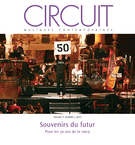
Circuit
Fostering Excellence in Electrical ResearchCircuit is a prominent academic journal published by PRESSES UNIV MONTREAL, specializing in the field of electrical engineering and circuit design. With its ISSN 1183-1693, the journal serves as a vital platform for disseminating cutting-edge research, innovative methodologies, and breakthrough technologies that shape the future of circuit theory and applications. Despite the absence of an official impact factor, the journal maintains a commitment to rigorous peer review and scholarly excellence, ensuring high-quality content for its readers. Although it operates under a traditional subscription model rather than Open Access, Circuit is essential for researchers, professionals, and students seeking to deepen their knowledge in circuit engineering and related disciplines. Its position within academic literature makes it an invaluable resource for advancing the understanding and development of electrical systems, highlighting the ongoing importance of this field in a technology-driven world.
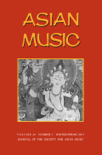
ASIAN MUSIC
Exploring the Soundscapes of Asia.ASIAN MUSIC is a distinguished academic journal published by University of Texas Press, focusing on the rich and diverse musical traditions of Asia. With an ISSN of 0044-9202 and an E-ISSN of 1553-5630, this journal serves as a key platform for interdisciplinary research that encompasses musicology, ethnomusicology, and cultural studies related to Asian music practices. While ASIAN MUSIC is not an open-access journal, it provides valuable insights and scholarly articles that contribute significantly to the understanding of music’s role within Asian cultures. The journal originally covered works from 2002 to 2010 and has a reputation for fostering discussions that celebrate the intricacies of sound, performance, and society. Targeting researchers, professionals, and students alike, ASIAN MUSIC stands as a crucial resource for those engaged in the study of music in its multifaceted context.

Zeitschrift der Gesellschaft fur Musiktheorie
Exploring the intersections of theory and practice in music.Zeitschrift der Gesellschaft für Musiktheorie (ISSN: 1862-6750, E-ISSN: 1862-6742) is a premier open-access journal published by the Gesellschaft Musiktheorie, devoted to advancing the field of music theory. Since its inception in 2003, it has provided a crucial platform for the dissemination of innovative research, theoretical discourse, and critical discussions pertinent to music analysis, pedagogy, and aesthetics. Based in Berlin, Germany, this journal not only showcases the latest in musicological scholarship but also fosters a vibrant community of researchers, practitioners, and educators. With a commitment to accessibility, all published articles are freely available, enhancing the reach and impact of the work within the global music community. This journal is essential reading for anyone seeking to deepen their understanding of musical structures and practices, making it an invaluable resource for students, academics, and music professionals alike.
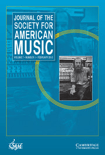
Journal of the Society for American Music
Fostering Dialogue in the World of American Music StudiesThe Journal of the Society for American Music is a leading academic journal dedicated to the study of American music and its diverse cultural contexts. Published by Cambridge University Press, this journal serves as a vital platform for researchers and professionals in the fields of musicology, ethnomusicology, and American studies, contributing significantly to scholarly discourse and advancing knowledge in these areas. With an impressive impact factor reflecting its academic rigor, it is placed in Q2 of the music category as of 2023 and ranks #55 out of 180 in the Arts and Humanities segment, placing it in the 69th percentile among its peers. Since its inception, the journal has published a wealth of articles, reviews, and critical studies that explore the rich tapestry of American musical traditions from historical and contemporary perspectives. It operates under a subscription model, ensuring a wide distribution and accessibility to its important findings. Researchers, students, and professionals alike will find the journal an essential resource for advancing their understanding of the dynamic landscape of American music.

Oido Pensante
Innovating Research at the Heart of Music and CultureOido Pensante is a prominent open-access journal dedicated to the multifaceted field of music, published by the esteemed University of Buenos Aires, specifically through its Faculty of Philosophy and Letters, Institute of Anthropological Sciences. Since its inception in 2013, this journal has fostered a rich platform for scholarly discourse and innovative research at the intersection of music and cultural studies. With an ISSN of 2250-7116, Oido Pensante aims to bridge theoretical frameworks and practical applications, making significant contributions to the understanding of music in its social context. Currently, it holds an impressive Q3 ranking in the Arts and Humanities – Music category for 2023, with a Scopus rank of #99 out of 180 journals, reflecting its commitment to academic rigor and relevance. The journal's open access policy ensures that research is widely disseminated and accessible, making it an invaluable resource for researchers, professionals, and students alike in Argentina and beyond. With converged years from 2017 to 2024, Oido Pensante continues to expand its reach, encouraging intellectual exchange and stimulating dialogue within the music community.
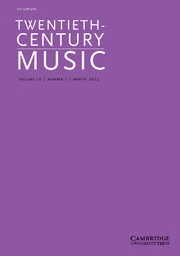
Twentieth-Century Music
Exploring the Soundscapes of a Century.Twentieth-Century Music is a premier academic journal dedicated to the study and critique of music composed in the twentieth century. Published by CAMBRIDGE UNIVERSITY PRESS, this journal holds an esteemed position in the music discipline, reflecting its significance with a Q1 ranking in the Music category as of 2023. Covering a wide timeline from its convergence years (2004 to 2010, 2012 to 2024), it serves as a vital platform for scholars, practitioners, and students to explore innovative research, critical analyses, and interdisciplinary approaches to music of this dynamic era. With an ISSN of 1478-5722 and E-ISSN 1478-5730, the journal is committed to maintaining high scholarly standards and includes open access options to enhance visibility and accessibility of research findings. As part of the robust arts and humanities community, which ranks it at 62 out of 180 in Scopus, Twentieth-Century Music is essential reading for anyone looking to deepen their understanding of contemporary musical trends and their historical contexts.

Opus
Advancing Knowledge in MusicologyOpus is an esteemed open-access journal published by the Associação Nacional de Pesquisa e Pós-Graduação em Música in Brazil, focusing on the field of music studies. With an ISSN of 1517-7017, Opus has been dedicated to fostering innovative research since its inception and has embraced the open-access model since 2009, ensuring that its findings are readily accessible to scholars and enthusiasts globally. The journal has achieved a commendable Q2 ranking in Music as of 2023, showcasing its impact and relevance within the arts and humanities. Although currently ranked #130 out of 180 in Scopus in the music category, Opus maintains a commitment to enhancing the scholarly discourse in musicology through empirical studies, theoretical analyses, and interdisciplinary approaches. The journal's convergence over the years, from 2017 to 2024, reflects its dedication to evolving educational and research methodologies in music. Situated in the vibrant academic landscape of Campinas, SP, Brazil, Opus invites researchers, professionals, and students to contribute to its mission of exploring the multifaceted dimensions of music.

Problemy Muzykalnoi Nauki-Music Scholarship
Advancing Knowledge in Music Theory and CultureWelcome to Problemy Muzykalnoi Nauki-Music Scholarship, a leading journal in the field of music scholarship published by the esteemed Gnesin Russian Academy of Music. With an ISSN of 2782-358X and an E-ISSN of 2782-3598, this Open Access journal has been committed to the dissemination of high-quality research since 2009, making scholarly work accessible to a global audience. Covering diverse aspects of music theory, history, and its socio-cultural impacts, Problemy Muzykalnoi Nauki serves as an essential platform for scholars, educators, and practitioners in the arts and humanities, as well as in social sciences related to music education. While its Scopus coverage was discontinued in 2021, the journal remains influential, holding a rank of #48 in the Arts and Humanities category and a percentile of 67th, showcasing its relevance and rigor in the discipline. We invite researchers and students alike to explore the rich contributions made within these pages, fostering a deeper understanding and appreciation of music in contemporary society.
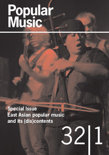
Popular Music
Charting the Evolution of Music and IdentityPopular Music, published by Cambridge University Press, is a leading academic journal that has been at the forefront of contemporary music studies since its inception in 1981. With its comprehensive scope encompassing a rich diversity of topics within the fields of Cultural Studies and Music, this journal holds a respectable Q2 ranking in both categories as of 2023, underscoring its significant impact on the scholarly discourse surrounding popular music. Researchers, professionals, and students alike will find invaluable insights within its pages as it explores the socio-cultural dynamics of music from various global perspectives. While it is not an open-access journal, the publication aims to foster critical dialogue and interdisciplinary scholarship. Based in the United Kingdom, Popular Music serves as a vital resource for those interested in the intersections of music, culture, and society, sustaining a vibrant academic community through rigorous peer-reviewed articles and reviews. Engage with the latest research and deepen your understanding of popular music's ever-evolving landscape.
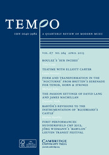
TEMPO
Pioneering Critical Conversations in Music ResearchTEMPO, a renowned journal published by Cambridge University Press, is dedicated to the expansive field of music studies. With its rich history dating back to 1939, the journal has significantly evolved, offering researchers, professionals, and students a platform to explore diverse musical perspectives and innovations. Serving as a vital resource in its category, TEMPO is currently positioned in the Q2 quartile within the field of Music, reflecting its quality and academic influence. Although it operates under a traditional subscription model, its impactful contributions to music scholarship are underscored by its active engagement with contemporary issues in musicology, performance, and education. Researchers can rely on TEMPO for cutting-edge analyses, reviews, and critical discourse that shape the understanding of music in society.